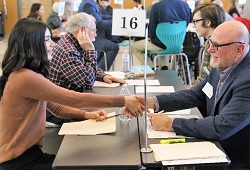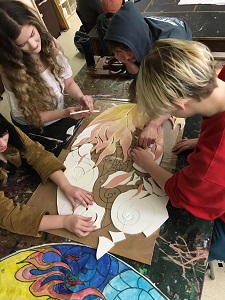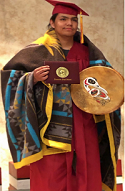WA School Examples of Mastery-based Learning
Release Date:
Several schools in Washington embody some of the characteristics of the Mastery-based Learning Work Group’s vision for MBL.
Delta High School (Pasco) and Avanti High School (Olympia) are both small choice schools that students opt into based on interest in a different education experience than is provided at the local comprehensive high school. Because of each school’s development of a relationship-based community-centered culture, they have been able to create robust advisory programs for their students. Both schools’ advisories meet regularly to offer academic and social/emotional support, as well as offer a safe place to bond with other students and build community.
Delta High School (Pasco)
In Delta’s STEM-focused program, students receive a variety of career-connected learning (CCL) experiences including interaction with career guest speakers, industry tours, job shadows, resume reviews, mock interviews, internship fairs, and more. Delta also hosts a variety of on and off-site events throughout the year, based on student interest identified in their HSBP and market trends.
"Each year we offer multiple career exploration events for all grades. Typically, 9th & 10th grade attend career exploration events in October and March such as Health Science Day, Nuke Tech Day, and STEMCon. At these events, I bring in industry professionals to lead hands-on workshops which give students a glimpse into real-world STEM careers in action. Juniors and seniors attend college and trade tours across the state based on personal interests and pathways," said Community Engagement Manager for Delta High School, Heather Hoppe.
Avanti High School (Olympia)
Avanti High School’s individualized learning plan approach allows students to learn at their own pace. Classes consist of mixed age and grade levels and students are not held to finishing course content within a defined term. Students who demonstrate mastery before the academic term is complete, may receive credit and begin a new course.
"I think the most important piece for me is that it takes a lot of work to set it up at first, but I find the pay off to be totally worth it. The work is really in front-loading the structure of the class, but once the students start to take more ownership of their learning, a lot of the work of a teacher in a more traditional classroom gets transferred to the students. When students monitor their own learning, the teacher's role becomes more of a coach or facilitator, and a lot of the busy work of grading and record keeping becomes more manageable and more meaningful to both students and teachers," said Cecily Schmidt, Visual Art instructor at Avanti High School.
Likewise, if a student has not demonstrated mastery of the content on a specific course by the end of the academic term, they have the option of extending that learning plan until they reach mastery, indicated by a letter grade of B or above, as well as self- evaluations and learning reflections completed by the student.
Students do not receive Cs, Ds, or Fs at Avanti. Rather, they continue to learn content until they reach mastery, which translates into academic credit.
Mastery-based crediting
Mastery-based (or competency-based) crediting is an option for students to earn high school credit for demonstration of learning on assessments that are clearly aligned to learning standards. Due to the coronavirus and related school building closures and ongoing disruptions of our educational system, the Work Group felt it was important to accelerate expansion of mastery-based crediting policies where possible. The Washington State School Directors Association (WSSDA) released model policies in six additional subject areas and SBE adopted a new section of rule to detail the process for granting students mastery-based (MB) credit. SBE also has included support for MBL in its 2021 legislative priorities and request legislation.
Student Highlight: Enumclaw High School (Enumclaw)
Enumclaw School District developed a sample model for how to provide credit through Indigenous pedagogical courses. One story out of Enumclaw High School is about student, Adam Miller, who would spend part of each season learning from elders and cultural practitioners while on canoe journeys and in the local environments. The policy allowed Adam to utilize these cultural experiences for graduation requirements, aligning the cultural learning to core learning standards.
Because Enumclaw acknowledges these important partnerships with the Local Tribal Community (Muckleshoot), he was able to graduate on time, and is the youngest person hired right out of high school by an environmental agency. The student now works to serve the community through environmental restoration.
For more information, check out the Mastery-based Learning Work Group page (where you can find membership information as well as the full 2020 report) or download a copy of the 2020 MBL graphic report summary.
Media Contact:
Stephanie Davidsmeyer
Communications Manager
stephanie.davidsmeyer@k12.wa.us





